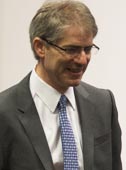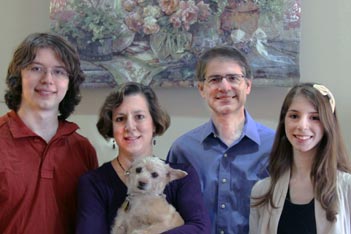Ben Alman: Training the Next Generation of Academic Surgeons

Ben Alman
|
Ben Alman, Vice-Chair of
the Department of Surgery
for Research and a distinguished
paediatric orthopaedic
surgeon and researcher,
will leave the University of
Toronto after 16 years of an
exemplary career in academic
surgery. He will join the
faculty at Duke University as
Chairman of the Department
of Orthopaedic Surgery.
Ben has been a Canadian citizen for the past 5 or more
years. He spent 16 years in Canada as a U.S. expatriate
and has a deep affection for both countries. He describes
the Department of Surgery at the University of Toronto
as a “large distinguished cohort of surgeons doing the
highest level of surgical science. It is like no other, and
despite the flux of science and of science funding, it has
grown and continues to grow.
Q: Can you compare academic surgery between
Canada and the United States?
A: “Overall, at least in orthopaedic surgery, clinical
practice is similar in academic centers. The community
practice of orthopaedics is quite different. There
is more money in healthcare in the US, but it does
necessarily flow to surgeons. For instance the overhead
is higher in the US. Also, because of how money follows
procedures, the number of surgeries performed
per population is higher. Duke has a very strong clinical
orthopaedic department, and several excellent researchers.
It just became a separate department, so there are
unique opportunities. I will have the mandate and the
resources to expand their academic activities and their
clinical reach. The system in the United States, at least at
Duke, is similar to ours- private practice in groups at the
hospital level, integrated at the Chair of Surgery level.”
Regarding the limitation of duty hours, Ben feels
that using the CBC framework (the Competency Based
Curriculum) “balances this problem out. The CBC,
a major advance in orthopaedic education, has transformed
training practice. It has been an incredible success
and this educational framework will likely become
the standard in North America. The board of orthopaedic
surgery is extremely enthusiastic about this model.
The Program Directors’ meeting in Orthopaedic Surgery
this coming year will have a special focus on the CBC,
with planned participation of the many of Toronto faculty,
including Markku Nousiainen, Richard Reznick,
Peter Ferguson, and Ben Alman.
“The Hospital for Sick Children has been a wonderful
experience. It is unique in North America. Because
of its large referral net, we have the luxury of deciding
how to organize practice, how to prioritize the treatments
and provide optimal care for patients. My clinical
practice was unique. The patients were largely ‘rare birds’
with unusual syndromes, neuro-muscular syndromes,
problems of great complexity. My day to day practice
included trauma, paediatric fractures, and scoliosis. The
technical aspects have evolved only slightly, but it’s the
thinking, that challenges the surgeon.

from left to right: Ben Alman with his wife Zena and their children Joshua
and Sophie
|
Q: What are your interests other than science and
surgery?
A: “I like to read.” There is a Chekhov short storybook on
his office shelf. He is currently reading Deception Point
by Dan Brown, and the last book he read was Thinking
Fast and Slow, by Daniel Kahneman. Ben is interested in
backpacking in the Grand Canyon, running, and photography.
His family includes his son Joshua, a senior at
Massachusetts Institute of Technology, studying combinatorics
and looking at graduate schools in Mathematics.
His daughter Sophie will be a freshman at Duke this
year. She is interested in neurobiology and the law. They
heard a fascinating lecture on the biological basis of ethical
decision making during a recent visit there. His wife
Zena is a University of Penn and Wharton School graduate.
She has been a very active volunteer in the Toronto
School system, in skating, and other activities centered
around their children as they grew up in Toronto.
Ben was a Material Science in Engineering major at
Penn, where he graduated summa cum laude. He chose
that major in part because it had no language requirements.
However, he came to dislike engineering practice
and went into biomaterials. This eventually led him to
take up medicine - to our great advantage. He sees surgery
as evolving toward less and less invasive procedures,
and transformation by biologics.
His primary clinical mentor was his partner at Tufts,
Michael Goldberg, a dismorphologist who wrote the
Dismorphic Child. “He encouraged me go to Toronto,
although it was bad for him. A true mentor is someone
who will do what’s good for you, even if it is bad
for them. Advisors usually do what’s good for both of
you. Bill Cole taught me how to integrate clinical work
with high quality science. Bob Salter and Mercer Rang
taught me how to talk with patients, John Wedge taught
me trainee management and leadership, and Richard
Reznick taught me to think big. Jim Rutka has been a
spectacular chairman, leader, and friend. In more recent
years, I’ve learned the most from the trainees I work with
and from my patients. My lessons for readers are summarized
in a slide from a recent talk I gave at Hospital
for Sick Children” (summarized in a box on page 8).
David Naylor pointed out the importance of training
the next generation of academicians and gave Ben the
advice to make sure he can do this in his future. That’s
what Ben has done so spectacularly at the University
of Toronto. He has mentored and advised over 100
students at the summer student, Master’s degree, and
PhD level in addition to his clinical trainees. He will
continue in the Research Institute of the Hospital for
Sick Children and his laboratory will continue in the
Mars building, so that while Duke will be enriched by
his joining their faculty, our Department will continue
to benefit from his inspiring leadership and scholarship.
M.M.
BEN'S ADVICE TO ACADEMIC SURGEONS
- Ask and answer good questions and don't give up too easily
- Diversify your interests, activities, and
education
- Time is your most important commodity
– don’t waste it on urgent but unimportant
activities
- Think outside the protocol – but treat
patients using common sense
- The most important thing you can do in academics
is teach and train the next generation
- Focus on what is important, Not what is easy
or measurable
- Talk to patients (and people) - they will teach
you really important things you’ll never learn
from the literature
- Be amazing and have fun!
Benjamin Alman
|
|